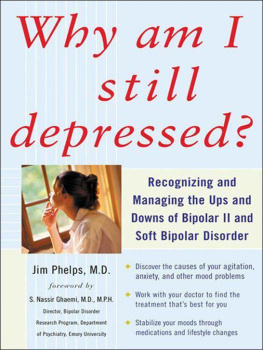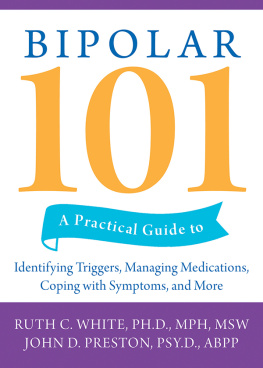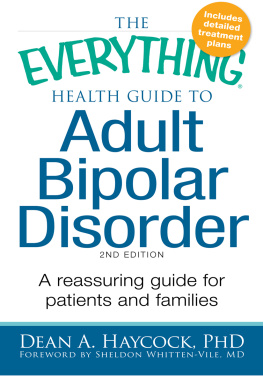Why am I still depressed?
Why am I still depressed?
Recognizing and Managing the Ups and Downs of Bipolar II and Soft Bipolar Disorder
Jim Phelps, M.D.


Copyright 2006 by James R. Phelps, M.D. All rights reserved. Manufactured in the United States of America. Except as permitted under the United States Copyright Act of 1976, no part of this publication may be reproduced or distributed in any form or by any means, or stored in a database or retrieval system, without the prior written permission of the publisher.
0071486941
The material in this eBook also appears in the print version of this title: 0071462376.
All trademarks are trademarks of their respective owners. Rather than put a trademark symbol after every occurrence of a trademarked name, we use names in an editorial fashion only, and to the benefit of the trademark owner, with no intention of infringement of the trademark. Where such designations appear in this book, they have been printed with initial caps.
McGraw-Hill eBooks are available at special quantity discounts to use as premiums and sales promotions, or for use in corporate training programs. For more information, please contact George Hoare, Special Sales, at george_hoare@mcgraw-hill.com or (212)904-4069.
TERMS OF USE
This is a copyrighted work and The McGraw-Hill Companies, Inc. ("McGraw-Hill") and its licensors reserve all rights in and to the work. Use of this work is subject to these terms. Except as permitted under the Copyright Act of 1976 and the right to store and retrieve one copy of the work, you may not decompile, disassemble, reverse engineer, reproduce, modify, create derivative works based upon, transmit, distribute, disseminate, sell, publish or sublicense the work or any part of it without McGraw-Hill's prior consent. You may use the work for your own noncommercial and personal use; any other use of the work is strictly prohibited. Your right to use the work may be terminated if you fail to comply with these terms.
THE WORK IS PROVIDED "AS IS." McGRAW-HILL AND ITS LICENSORS MAKE NO GUARANTEES OR WARRANTIES AS TO THE ACCURACY, ADEQUACY OR COMPLETENESS OF OR RESULTS TO BE OBTAINED FROM USING THE WORK, INCLUDING ANY INFORMATION THAT CAN BE ACCESSED THROUGH THE WORK VIA HYPERLINK OR OTHERWISE, AND EXPRESSLY DISCLAIM ANY WARRANTY, EXPRESS OR IMPLIED, INCLUDING BUT NOT LIMITED TO IMPLIED WARRANTIES OF MERCHANTABILITY OR FITNESS FOR A PARTICULAR PURPOSE. McGraw-Hill and its licensors do not warrant or guarantee that the functions contained in the work will meet your requirements or that its operation will be uninterrupted or error free. Neither McGraw-Hill nor its licensors shall be liable to you or anyone else for any inaccuracy, error or omission, regardless of cause, in the work or for any damages resulting therefrom. McGraw-Hill has no responsibility for the content of any information accessed through the work. Under no circumstances shall McGraw-Hill and/or its licensors be liable for any indirect, incidental, special, punitive, consequential or similar damages that result from the use of or inability to use the work, even if any of them has been advised of the possibility of such damages. This limitation of liability shall apply to any claim or cause whatsoever whether such claim or cause arises in contract, tort or otherwise.
To Anna-Maria, the fixed foot of my compass
Contents
PART I
Do You Have a "Mild" Form of Bipolar Disorder?
CHAPTER 1
Understanding the Mood Spectrum and How It Can Help You
CHAPTER 2
Can You Be a Little Bipolar? Recognizing Hypomania
CHAPTER 3
No Mania or Hypomania? Understanding "Soft" Bipolar Disorder
CHAPTER 4
Making Your Diagnosis
CHAPTER 5
What Else Could It Be? Ruling Out Conditions That Mimic Bipolar Disorder
PART II
Finding and Using the Right Treatment
CHAPTER 6
Getting Help: How You Can Work with Your Doctor
CHAPTER 7
Where to Start: Guidelines for Choosing Treatment
CHAPTER 8
Mood Stabilizers: The Core Ingredient in Medication Treatment
CHAPTER 9
What You Need to Know When Considering Antidepressants
CHAPTER 10
Managing Weight Gain from Medications or Other Causes
CHAPTER 11
Simple Lifestyle Changes That Can Improve Symptoms
CHAPTER 12
How to Use Psychotherapy Across the Mood Spectrum
CHAPTER 13
Exercise: Not the Usual Rap
CHAPTER 14
How Family and Friends Can Help
Foreword
A patient told me the other day: "I don't expect to be happy; I just don't want to be depressed." We should be doing better, and part of the solution, I think, is to move away from simple-minded diagnoses and prescriptions about depression.
There is so much antidepressant use these days that Prozac is literally in the water in detectable amounts, leading to some environmental concerns regarding the effects on fish. Yet the treatment of depression is not as effective as it should be. One is tempted to recall the ironically prescient words of the nineteenth-century physician Oliver Wendell Holmes who said that "if the entire materia medica, as now used, could be sunk to the bottom of the sea, it would be all the better for mankindand all the worse for the fishes." It turns out that antidepressants are not the panacea that many once thought. One reason is that antidepressants are not always antidepressants. In some persons, like those with bipolar illness, they may not work well and in fact can make things worse.
The key issue in diagnosing and treating depression is to know what kind of depression one faces. Is it vanillastraight, regular, "unipolar" depressionor is it chocolatedepression with mood swings, manic symptoms, "bipolar" depression? And if bipolar, is it standard bipolar disorderclassic manic-depressive illness with extremes of high and lowor is it a variety of the bipolar "spectrum"recurrent depression with milder highs or other features of bipolar illness?
1. http://www.cnn.com/2003/TECH/science/11/14/coolsc.frogs.fish
2. Holmes OW: Medical essays 18421882. Boston: Houghton Mifflin, 1891
To understand depression, to treat it, and to recover from it, we really need to understand more about the two varieties and especially the bipolar spectrum. This is not a straightforward topic; a great deal of controversy rages in academe, and it has for decades, a sure sign of our ignorance. We have not understood this disease well: depression in all its varieties. We have not studied and examined the bipolar spectrum concept as well as we should. We do not clearly understand, beyond a reasonable doubt, when to use antidepressants and when not to use them. Yet recognizing our lack of knowledge, and increasing our awareness of these problems, is the first step forward.
In the daily work of clinical practice, this awareness of our limitations paradoxically opens new vistas in the diagnosis and treatment of depression. Not all depression is the same, and not all depression responds to antidepressants. In Why Am I Still Depressed? Jim Phelps provides a nuanced and clinically wise rendition of the state of the art. Here he describes the varieties of depression, the concept of the bipolar spectrum, the utility and limitations of antidepressants, the benefits and limits of mood-stabilizing agents, and, perhaps most importantly, how to put it all together. He does all this from the standpoint of a highly informed practicing psychiatrist, someone who observes the academic wars, and then sees what they mean in the daily treatment of patients.
Next page















